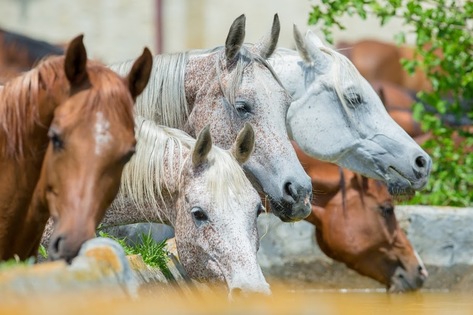
The Most Popular Horse Breeds Of 2019
Equestrian Advice & Guides General Equestrian
Build your business profile for FREE and expose your services to thousands of potential clients!
Create my profile now!
The summer brings horse shows, trail rides, sport horse competition and endurance races. Many people worry about their horses hydration status, especially if they are away from home during the intense heat of the summer. Horses can be very finicky about their water, and all water is not created equal! Water can taste very different depending on its PH which tells how alkaline or acidic it is. The mineral content can also vary depending on the area of the country that you are in. The amount of dissolved minerals can greatly effect the palateability of the water, this includes the amount of calcium, magnesium, sodium, and potassium in the water which determines how hard or soft the water is! Horses are extremely sensitive to the taste and smell of their water.
This is why many horse show participants haul water from home for their horses. But if you don’t have that luxury for your horse because your in an endurance competition, or on a trailride, then what should you do to ensure your horse is adequately hydrated? When your on endurance competitions where water is not readily available, because of the climate such as a desert race, you should soak hay cubes in water and take them with you. If your trail riding, and your not sure about the safety of natural water sources. You can use this rule of thumb as guideance to determine the safety of the water source. Clarity is very important, but you must consider the amount of rainfall and runoff in the area. Odor is also important because it will determine how palatable the water will be. Temperature also effects palateability, because horses like their water around 20 °C or 68 °F. The color of the water should also be inspected, (but water quality should not be judged by color alone). You should never let your horse drink from cloudy musty smelling or green molded smelling water.
An adult horse should drink 7-10 gallons of water per day if they are idle. Horses who are working need 10-18 gallons per day! Your horse needs water to keep its body healthy, hydration is everything! The proper balance of water and body salts controls everything from the gut to the brain. When your horse starts getting dehydrated it puts your horse's health at risk. It stresses their kidneys, heart, and gut function. Whether you have a polished show horse, a race horse or just your personal pleasure horse, we must ensure they have access to clean drinking water, and replacement of electrolytes lost through sweat. The best way to encourage your horse to drink is to provide clean frequently scrubbed buckets and water troughs. The correct sodium balance helps your horse's thrist response to work, which keeps the water in their body in balance.
How long it takes your horse to become dehydrated depends on many individual factors affecting their hydration status including the weather, their diet, their, age, breed, if their pregnant, lactating, and the amount of work they are doing. How can you evaluate your horse's hydration status?
We will first discuss how to check your horse’s gums for capillary refill and perfusion.
Lift the upper lip of your horse and look at the mucous membranes above the teeth line. They should be pink, shiny, and moist. If they are pale white, brick red, bluish purple, muddy colored or jaundiced (yellowish) Your horse is having a serious health crisis. Next use your finger to press on the gums, if capillary refill is normal it will return to normal in 1-2 seconds. A delay of more than 2 seconds is reason for concern. The horse's blood perfusion is slow or delayed because it has a low circulating blood volume due to dehydration. You need to contact a vet immediately. The skin pinch test is an easy way to access your horse’s hydration status. Skin elasticity is based on the amount of water present. When the skin is pinched it should snap right back, if it doesn’t your horse is behind on their hydration status. It is important you know what is normal for your horse as it can vary by breed and age.
If your horse is sick or away from their normal water source because you are traveling, trail riding, or at a show, there are several tricks you can use to get them to drink water. The following are helpful suggestions to sweeten a 5 gallon bucket of water.
Do you need to worry about a horse drinking to much water?
A normal healthy horse will not drink an excessive amount of water! If you have a horse drinking to much water they may have Cushings Disease. The intake of excessive water can put stress on the kidneys as they try to eliminate the excess water. But it also can dilute the electrolytes in a horse's body which can make it difficult for the horse to regulate their body temperature. So, if you have a horse with a preexisting condition it can be more dangerous for them to get dehydrated. I have tried to provide a lot of relevant information in a concise format. So if you have special questions about your horse, please consult with your veterinarian that is familiar with your horse’s needs.
Dr. Dana Price

